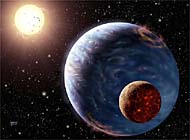Geneva illuminates the dark sciences

Many people find science confusing and intimidating. The city of Geneva is holding a special "Science Night" to show that it doesn't have to be.
The event is designed to persuade people to overcome their natural aversion to science, to showcase the city’s rich scientific heritage and perhaps even inspire children to take up science as a career.
Science Night will be held in and around the Museum of the History of Science, in the Perle du Lac Park. It will start at 1400 on Saturday and continue until 0500 the following morning. The nocturnal nature of the event is deliberate: the subjects include astronomy, the behaviour of nocturnal animals and a lecture about Frankenstein.
“The idea behind the Science Night is to get the general public and scientists together,” says Ninian Hubert van Blyenburgh, one of the organisers.
“A lot of people are afraid of science,” he told swissinfo. “There is also a real lack of communication between the public and the world of science. We’re hoping to fill the gap between these two worlds.”
Many of the activities, expecially those earlier in the evening, are geared towards children and families. French and Dutch theatre groups will be putting on short plays with scientific themes, and there will be guided tours of the museum and the nearby botanical gardens, as well as hands-on workshops focusing on the weather, dinosaurs and the solar system.
“Science forms an integral part of our culture. It helps to change the way we see the world,” says Alain Vaissade, the mayor of Geneva. “As you can see from the activities on offer, Science Night is meant to make learning fun and accessible.”
The aim is also to make scientists accessible. Researchers from the nearby European nuclear research centre, CERN, will be taking part, as will scientists from Geneva university, the Natural History Museum, the cantonal hospital, and a number of cantonal government departments and other institutions.
“Scientists need to get in touch with the public. And the public wants to understand what goes on the laboratories,” Cesar Mänz, director of Geneva’s Art and History museums, told swissinfo.
“I think it’s very important to create a kind of vector between the collections in our museums, the traditions of science in Geneva and the population at large. We must find a way of overcoming people’s fear of science, not by simplifying it, but by explaining it,” he said.
One of the main reasons for Science Night is to make local people more aware of the Museum of the History of Science, one of the city’s loveliest treasures.
“It’s an extraordinary museum. Geneva is the only Swiss city which has such a museum, and one of the few anywhere with such a big collection of scientific instruments. We’re proud of this rich heritage and we want to share it with the people of Geneva,” Mänz says.
The city authorities clearly think they’ve hit on a good idea. The Science Night looks like becoming an annual fixture.
“I don’t know whether the next Science Night will be the same as this one. But the idea is that such events will encourage scientists to speak more about their work,” says Ninian Hubert van Blyenburgh.
by Roy Probert

In compliance with the JTI standards
More: SWI swissinfo.ch certified by the Journalism Trust Initiative
You can find an overview of ongoing debates with our journalists here. Please join us!
If you want to start a conversation about a topic raised in this article or want to report factual errors, email us at english@swissinfo.ch.